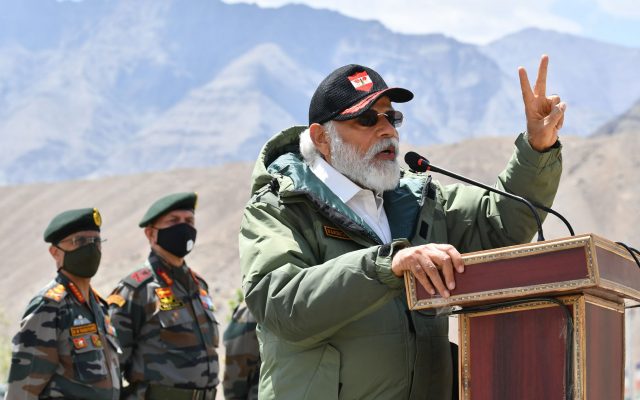
New Delhi: The surprise visit to Ladakh by Prime Minister Narendra Modi underscored India’s resolve to beat back Chinese aggression and sent a clear message to China when he referred to “expansionism”, says a Chinese affairs expert.
Modi’s visit and the speech were morale boosters for the troops and his reference to “expansionism” echoed the mounting international concern over China’s “imperial overreach under Xi Jinping, who has simultaneously opened multiple fronts,” said strategic affairs expert Brahma Chellaney.
“After weeks of concerted government effort to downplay the Himalayan border confrontation and obscure China’s encroachments, Modi’s visit to Ladakh helped shine a spotlight on the war-like situation India confronts,” he said.
Asserting that China has sought to take advantage of the world’s preoccupation with the COVID-19 pandemic, Chellaney said Xi has been pushing the limits, be it breaking Beijing’s binding commitment to Hong Kong’s autonomy, attempting to police the waters off the Japanese-controlled Senkaku Islands or picking up a border fight with India by encroaching on its territory.
President Xi’s actions are shifting attention from China’s culpability in the global spread of COVID-19 to the threat his authoritarian regime poses to international security, Chellaney said.
“Xi’s ambition, coupled with the concentration camps he has set up and the cult of personality around him, has led some to compare him with other expansionist despots of modern history. US National Security Adviser Robert O’Brien recently said that ‘Xi sees himself as Joseph Stalin’s successor’,” Chellaney said.
Two weeks before he went to Ladakh, Modi had created confusion with a speech at an all-party meeting, but with his remarks in Ladakh, Modi has made amends for the June 19 speech, the strategic affairs expert said.
The Indian and Chinese armies are locked in a bitter standoff in multiple locations in eastern Ladakh for the last seven weeks.
Asked about India’s move to ban 59 Chinese mobile applications and the strategy of creating trade barriers to deal with an aggressive China, Chellaney said India must fight China’s aggression on all fronts, including economic and diplomatic.
India should leverage its buying power to correct the trade imbalance with China and impose costs on Beijing for its belligerence, Chellaney said.
On whether India can depend on the US or some other allies against China, he said India can expect some diplomatic support but no military support from the West.
Talking about the options for resolving the border crisis, Chellaney said China has changed the territorial status quo through incursions into Ladakh, and India wants to restore status quo ante.
“China is unlikely to peacefully vacate its encroachments,” he said.
Against this background, India must use its economic and diplomatic cards to raise China’s costs, Chellaney said.
It must prolong the military standoff to put the international spotlight on the Chinese aggression, he said, adding that India must also end its one-China policy.








